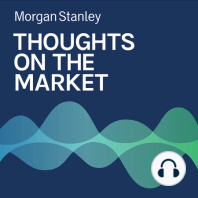3 min listen

Sheena Shah: Is Cryptocurrency Becoming Currency?
Sheena Shah: Is Cryptocurrency Becoming Currency?
ratings:
Length:
4 minutes
Released:
Mar 31, 2022
Format:
Podcast episode
Description
As interest in using cryptocurrencies for transactions continues to rise for both consumers and businesses, crypto has begun a cycle of increased stability and popularity - but the question is, can this cycle continue? -----Transcript-----Welcome to Thoughts on the Market. I'm Sheena Shah, Lead Cryptocurrency Strategist for Morgan Stanley Research. Along with my colleagues bringing you a variety of perspectives, today I will be asking the question - are cryptocurrencies currency? It's Thursday, March 31st at 2:00 p.m. in London. Did you really buy that house with crypto? Or did you just sell your crypto for dollars and use dollars to buy the house? Crypto skeptics think that goods cannot be priced in cryptocurrencies like bitcoin, primarily because their price is too volatile. But at some point, if crypto begins to be used for enough purchases of everyday goods and services, prices may begin to stabilize. Increased stability will further entice consumers to use crypto, and the cycle will continue. The question has always been, will this virtuous cycle ever begin? The answer is now clear, it has already begun. Here are some examples. Firstly, paying with cryptocurrency needs to be as easy as paying with a credit or debit card today. Over 50 crypto companies and exchanges have issued their own crypto cards, and these are attached to the Visa or MasterCard payments networks, meaning they're accepted all around the world. In the last quarter of 2021, Visa said its crypto related cards handled $2.5 billion worth of payments. Now that may sound small, at less than 1% of all Visa's transactions, but it is growing quickly. The difficulty in increasing crypto adoption is getting the merchant to accept crypto. It needs to be easy and cheap, which is something lots of new crypto companies and products are trying to achieve. Secondly, many would argue that something can only be a currency if you can pay your taxes with it. Even that is changing today. Over the past year, local and some national governments have introduced or proposed laws that will allow its residents to use cryptocurrency to pay their taxes. El Salvador famously made bitcoin legal tender in its country in 2021. In the past week, Rio de Janeiro announced it will become the first city in Brazil to allow cryptocurrency payments for taxes starting next year. It isn't just emerging economies, though, that are trying to attract global crypto investors. The city of Lugano in Switzerland has teamed up with Tether, the creator of the largest stablecoin - a type of cryptocurrency that's kept stable versus the U.S. dollar, to make bitcoin and two other cryptocurrencies de facto legal tender. In the U.S., Colorado is hoping to become the first state to accept crypto for taxes later in the year, and Florida's governor is investigating the logistics of doing the same. Both these proposals may be difficult to put into law in the end, as the U.S. constitution doesn't allow individual states to create their own legal tender, but it hasn't stopped these proposals and more from coming in. In both these examples, the receiver of the crypto typically immediately converts to fiat currency, like U.S. dollars, through an intermediary service provider. So let's come back to our original question - did you really buy that house with crypto? In February, a house in Florida was sold for 210 Ether, the second largest crypto, or the equivalent of over $650,000 dollars. Interestingly, the seller received the ether but didn't liquidate into U.S. dollars soon afterwards due to market volatility, because the value of ether in U.S. dollars fell by around 10%. Consumers and businesses are increasingly wanting to transact in cryptocurrency. Maybe most are simply wanting to trade the value of the asset, but as it becomes easier to transact in crypto and legal structures are defined, cryptocurrencies could start to become currency. The question is, will the virtuous cycle continue or be broken? Cryptocurrenci
Released:
Mar 31, 2022
Format:
Podcast episode
Titles in the series (100)
Mike Wilson: Are U.S. Economic Indicators Flashing Yellow? by Thoughts on the Market